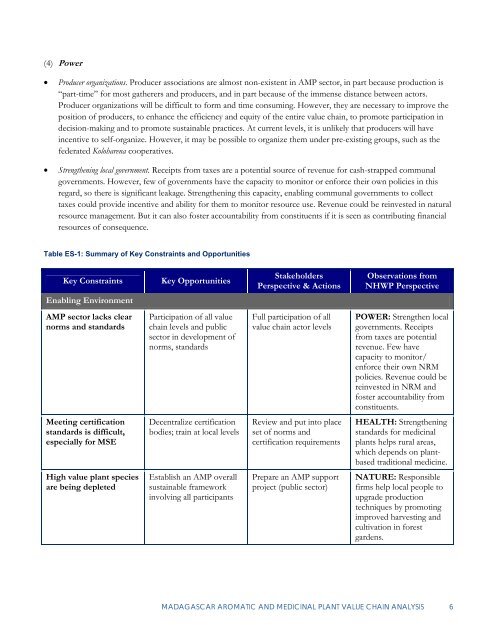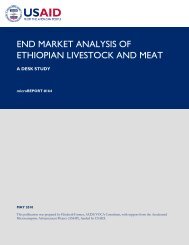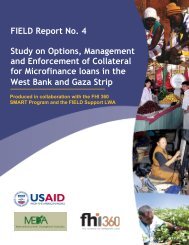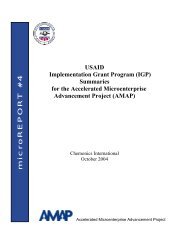Madagascar Aromatic and Medicinal Plants Value - Microlinks
Madagascar Aromatic and Medicinal Plants Value - Microlinks
Madagascar Aromatic and Medicinal Plants Value - Microlinks
Create successful ePaper yourself
Turn your PDF publications into a flip-book with our unique Google optimized e-Paper software.
(4) Power<br />
• Producer organizations. Producer associations are almost non-existent in AMP sector, in part because production is<br />
“part-time” for most gatherers <strong>and</strong> producers, <strong>and</strong> in part because of the immense distance between actors.<br />
Producer organizations will be difficult to form <strong>and</strong> time consuming. However, they are necessary to improve the<br />
position of producers, to enhance the efficiency <strong>and</strong> equity of the entire value chain, to promote participation in<br />
decision-making <strong>and</strong> to promote sustainable practices. At current levels, it is unlikely that producers will have<br />
incentive to self-organize. However, it may be possible to organize them under pre-existing groups, such as the<br />
federated Koloharena cooperatives.<br />
• Strengthening local government. Receipts from taxes are a potential source of revenue for cash-strapped communal<br />
governments. However, few of governments have the capacity to monitor or enforce their own policies in this<br />
regard, so there is significant leakage. Strengthening this capacity, enabling communal governments to collect<br />
taxes could provide incentive <strong>and</strong> ability for them to monitor resource use. Revenue could be reinvested in natural<br />
resource management. But it can also foster accountability from constituents if it is seen as contributing financial<br />
resources of consequence.<br />
Table ES-1: Summary of Key Constraints <strong>and</strong> Opportunities<br />
Key Constraints Key Opportunities<br />
Enabling Environment<br />
AMP sector lacks clear<br />
norms <strong>and</strong> st<strong>and</strong>ards<br />
Meeting certification<br />
st<strong>and</strong>ards is difficult,<br />
especially for MSE<br />
High value plant species<br />
are being depleted<br />
Participation of all value<br />
chain levels <strong>and</strong> public<br />
sector in development of<br />
norms, st<strong>and</strong>ards<br />
Decentralize certification<br />
bodies; train at local levels<br />
Establish an AMP overall<br />
sustainable framework<br />
involving all participants<br />
Stakeholders<br />
Perspective & Actions<br />
Full participation of all<br />
value chain actor levels<br />
Review <strong>and</strong> put into place<br />
set of norms <strong>and</strong><br />
certification requirements<br />
Prepare an AMP support<br />
project (public sector)<br />
Observations from<br />
NHWP Perspective<br />
POWER: Strengthen local<br />
governments. Receipts<br />
from taxes are potential<br />
revenue. Few have<br />
capacity to monitor/<br />
enforce their own NRM<br />
policies. Revenue could be<br />
reinvested in NRM <strong>and</strong><br />
foster accountability from<br />
constituents.<br />
HEALTH: Strengthening<br />
st<strong>and</strong>ards for medicinal<br />
plants helps rural areas,<br />
which depends on plantbased<br />
traditional medicine.<br />
NATURE: Responsible<br />
firms help local people to<br />
upgrade production<br />
techniques by promoting<br />
improved harvesting <strong>and</strong><br />
cultivation in forest<br />
gardens.<br />
MADAGASCAR AROMATIC AND MEDICINAL PLANT VALUE CHAIN ANALYSIS 6





